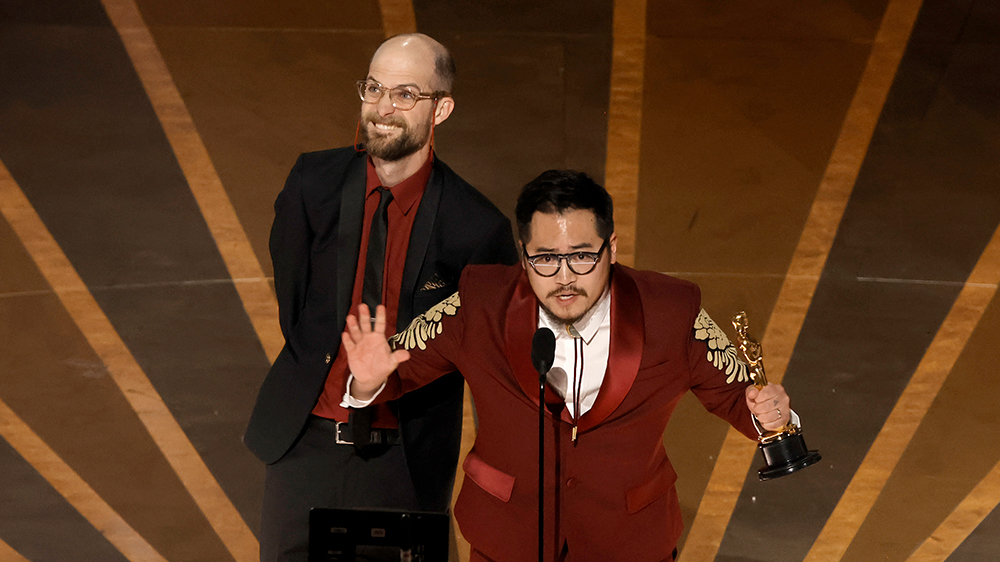
A24, the scrappy indie studio that has built a brand for itself as a home for hip and cutting-edge movies, triumphed over its deeper-pocketed rivals at the Oscars on Sunday. It scored a leading nine wins, topping that of its closest competitor, Netflix, which had to settle for six trophies. Plus, A24 not only captured best picture for “Everything Everywhere All at Once” but also pulled off the incredibly rare feat of winning every major acting category, with three statuettes coming for the cast of the head-spinning adventure film and the other one recognizing Brendan Fraser’s work in “The Whale.”
But don’t expect the studio to do a victory lap. Co-founders David Fenkel and Daniel Katz (who named their shop after the highway that connects Rome to Teramo) shun the spotlight and have done almost no interviews or profiles, though they have certainly been asked. Rather, the indie moguls say they prefer to let their films speak for themselves — an anomaly in Hollywood, where executives usually push one another aside to claim credit for successes.
On Sunday, the highest-stakes night in A24’s history, head of film Noah Sacco and communications and distribution head Nicolette Aizenberg refused to be photographed on the carpet. When Sacco was approached by Variety to mark the occasion with a photo, as executives like Bob Iger of Disney and David Zaslav of Warner Bros. Discovery had already done, he deferred to Aizenberg. She politely declined.
“Whatever my work wife says,” Sacco said before heading into the auditorium.
With “Everything Everywhere All at Once,” A24 propelled an offbeat metaverse-spanning adventure film into a box office sensation, taking in more than $100 million worldwide — a stunning result given the financial difficulties facing the art-house movie business. Then, it turned a movie dramatically removed from typical awards bait — a martial arts-infused yarn that featured characters sporting hot dog hands and brandishing weaponized dildos — into an Oscar juggernaut. Its seven victories are the most for any best picture winner since 2008’s “Slumdog Millionaire” (which won eight).
To be sure, A24 has suffered setbacks on the way to its golden night. Rivals gripe that the studio overspends to market its movies and that its buzzy successes, like “Everything Everywhere,” “Moonlight” and “Hereditary,” paper over a long list of money losers. (Ever hear of “Under the Silver Lake” or “When You Finish Saving the World”? A24 produced those films too.) But it has taken a part of the movie business that had seemed geared to grandparents and older tastemakers and injected a youthful swagger by betting on emerging talent.
In 2020, facing a difficult landscape for theatrical distribution, A24 began exploring a buyout, valuing itself at $2.5 billion to $3 billion. Whether the offers weren’t to its liking or it opted to chart a different course, the company ultimately decided to end sales talks. Instead, it announced an equity investment of $225 million from a fundraising round led by equity firm Stripes. A24 also poached its first-ever chief financial officer — J.B. Lockhart, the NBA’s CFO — to help figure out a way for the company to grow organically.
TV is a prime target, especially after the studio delivered HBO the provocative teen drama “Euphoria,” a ratings hit. On the horizon is the pricey “The Idol,” also at HBO, starring Lily-Rose Depp and the Weeknd. Following that is “The Curse” at Showtime, from the Safdie brothers and Nathan Fielder and starring Emma Stone. On the film front, there’s Ari Aster’s mainstream drama “Beau Is Afraid” with Joaquin Phoenix. A24 also is looking at the live event space with the recent acquisition of the historic Off Broadway theater Cherry Lane, and is dipping into music with an investment in Larry Jackson’s startup Gamma.
On Sunday, even A24’s competitors seemed to recognize its Oscars accomplishment. Tom Quinn, co-founder of Neon, an indie studio that also has made a name for itself by distributing more challenging and avant-garde fare, likened what A24 pulled off to his company’s success in willing 2019’s “Parasite” to a best picture victory.
“I kind of want to go to their party to celebrate if they win,” Quinn confessed on the carpet.
He argued that “Everything Everywhere All at Once” demonstrated that there still is an audience for art-house theatrical releases — something that has been questioned in the wake of box office failures such as “Tár,” “The Son” and “Armageddon Time.” Part of the reason A24 may be flourishing where others fail is that its films attract younger crowds who aren’t as concerned about COVID as older moviegoers are; that helped lift ticket sales for “Everything Everywhere.”
“It’s fantastic,” Quinn said. “It’s a real theatrical success. It is a real piece of cinema. It’s working on so many different levels. I’m all in.”
And A24’s triumph on Sunday was achieved despite competition from streamers like Netflix. The tech giant has done a great deal to upend the way movies are made and seen. It also has spent lavishly as it tries, so far unsuccessfully, to score best picture statuettes for the likes of “Roma,” “The Irishman” and this year’s “All Quiet on the Western Front.”
“What it means is that once again the streamers don’t win,” says Tom Bernard, co-founder of Sony Pictures Classics, an indie studio that, like A24, still releases movies theatrically.













